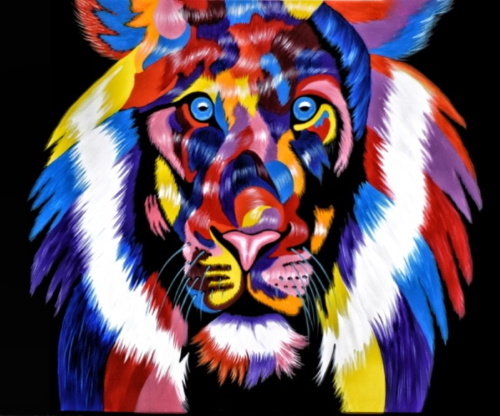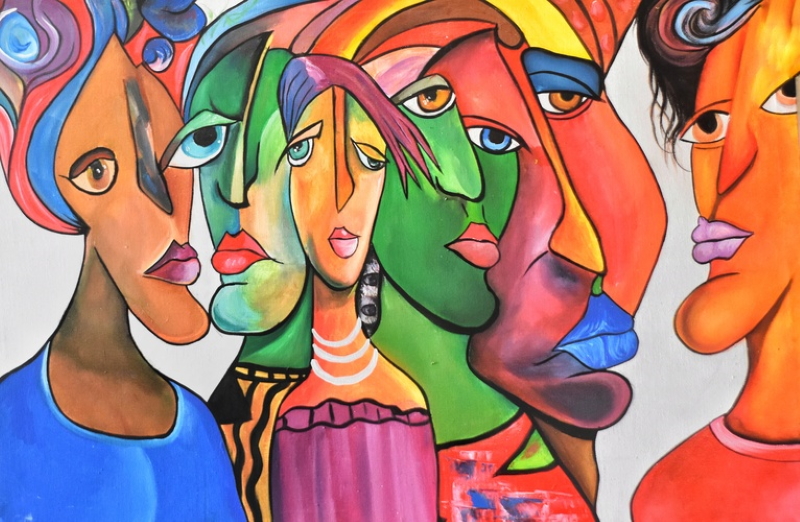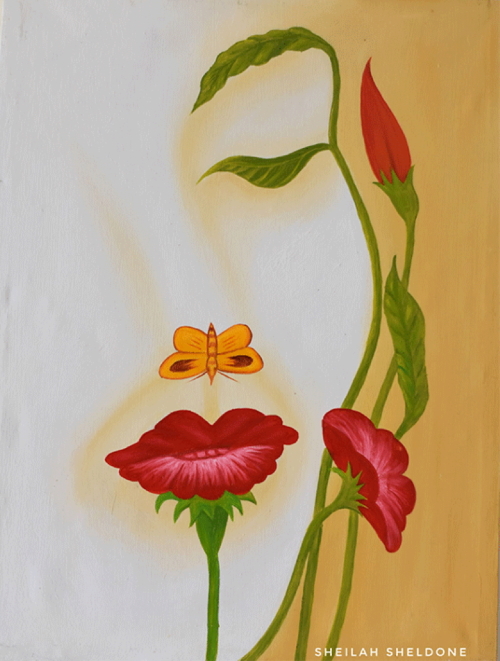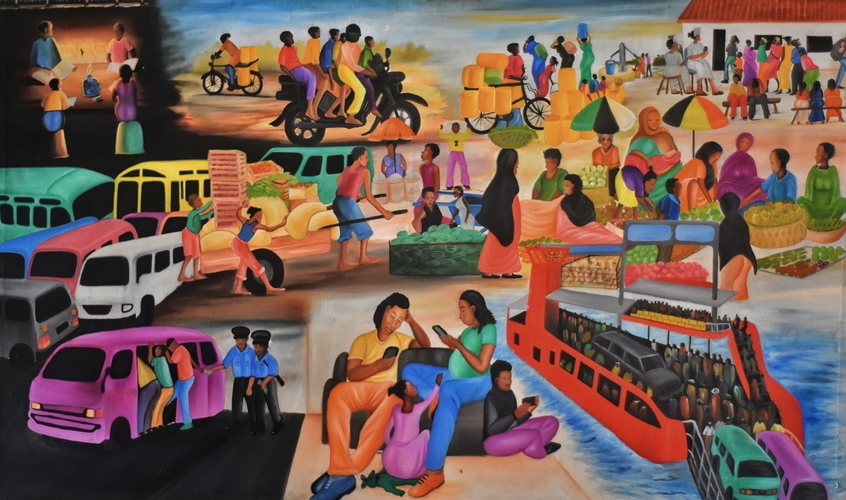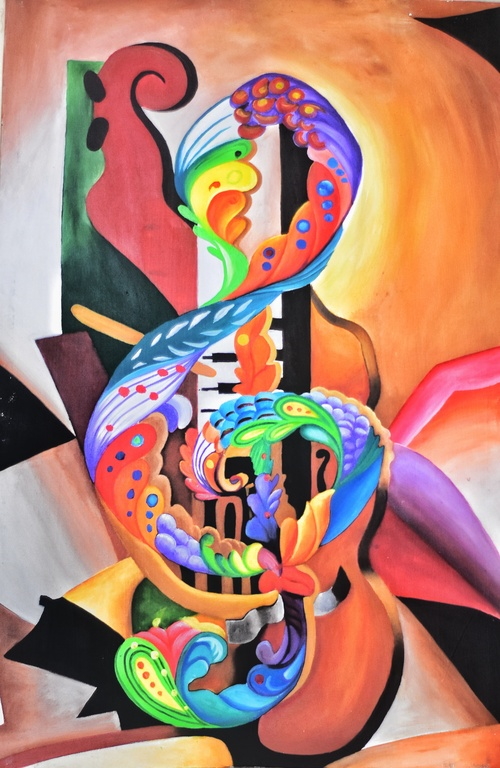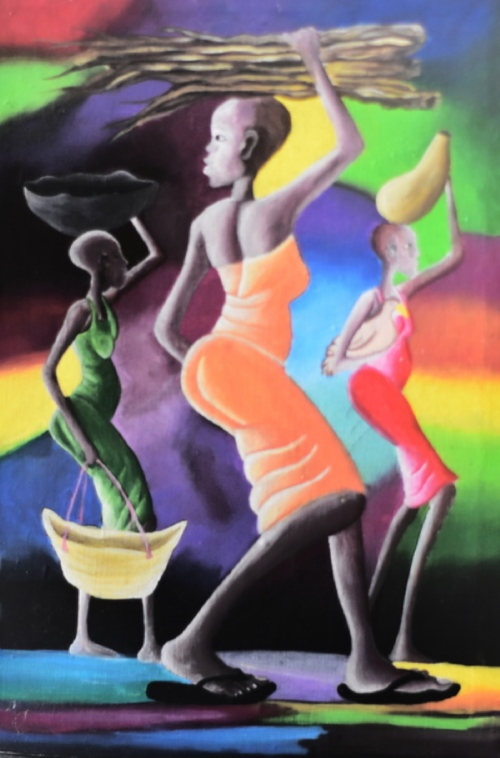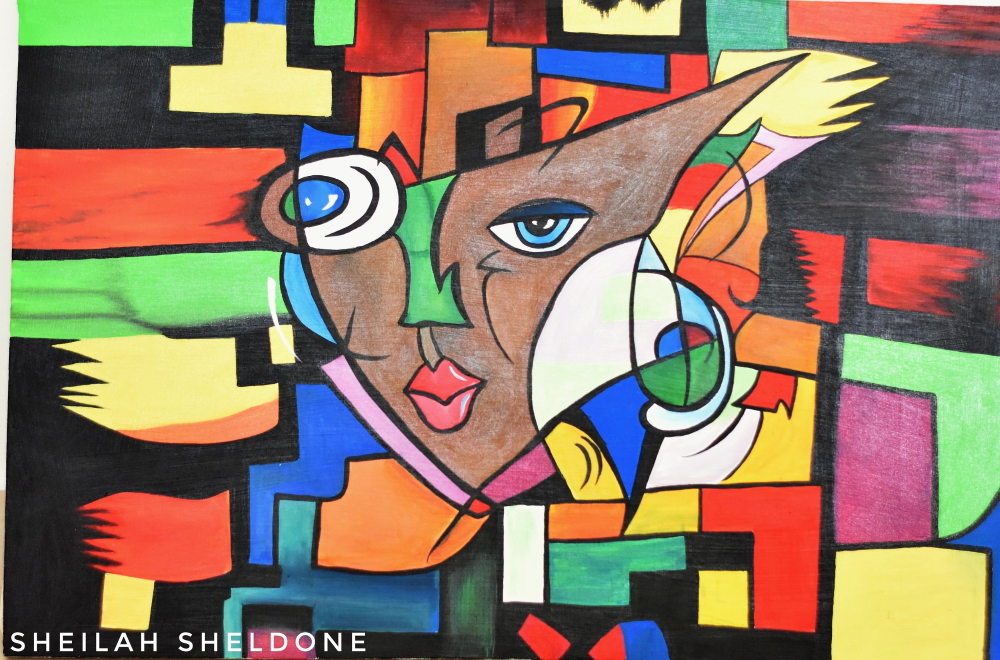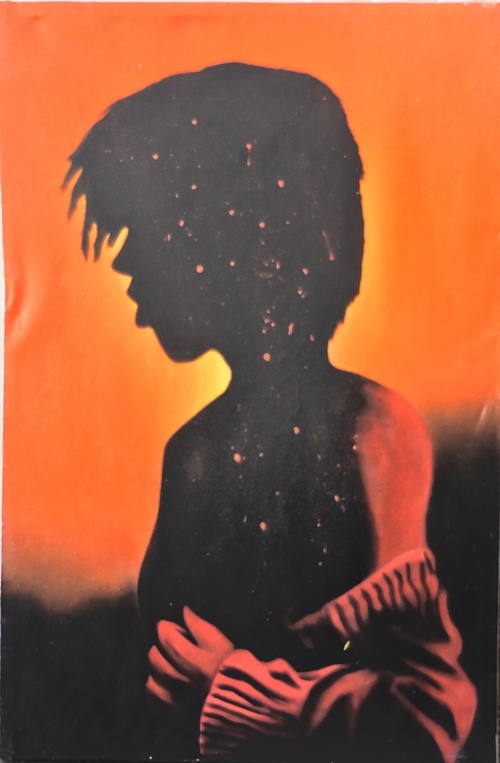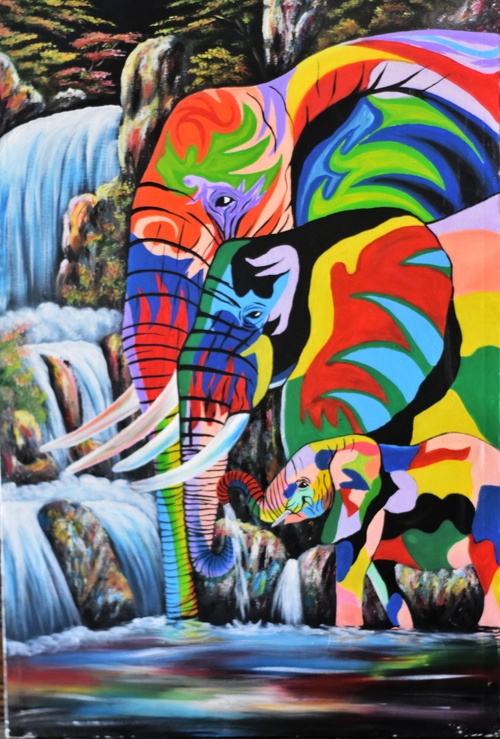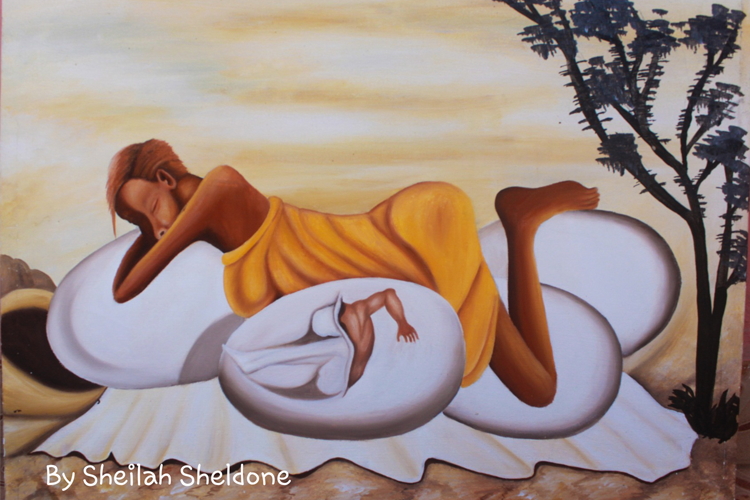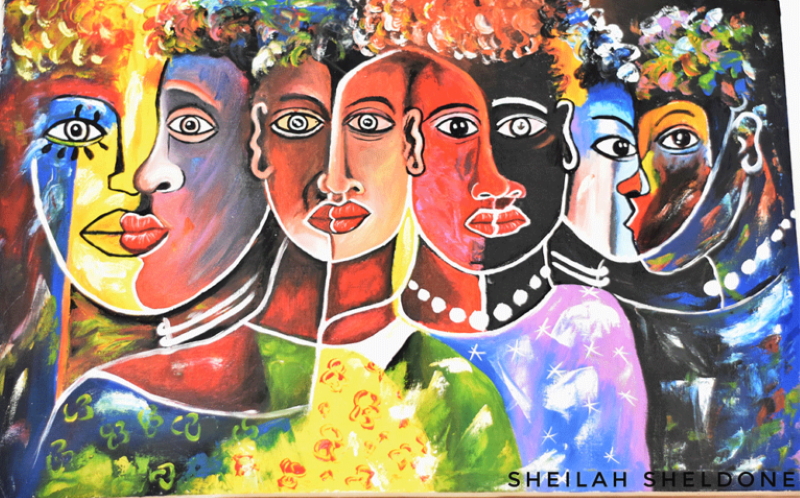Sheilah Sheldone Charles
"Young art genius" / painter
Kenya
„To be young, gifted and black“. The title of this 1969 hit recording by Afro-American singer, songwriter, pianist Nina Simone fits to this female artist perfectly. Already at a very young age the 2009-born was „making waves in the art world. The young Kenyan painter has impressed the public and celebrities alike with her colorful artworks and portraits“ (NBS Television). Besides having received The Youngest Lioness Award the newcomer was among the Top 100 child prodigies worldwide and got an award for her distinctive flair in painting. „She was nominated by the UC Davies University in California, USA to give a speech about Martin Luther King Jr.“, states dailyactive.info. „Launched in 2006 to commemorate the American musician and civil rights activist Eunice Kathleen Waymon popularly known as Nina Simone, the award honors Black history and unsung achievers within the Black community.“ The fact that „Kenya's young art genius“ (dw.com) was awarded „is a move which is believed that Sheilah has the ability to change the mindsets of the youth!“
Sheilah Sheldone Charles
"Young art genius" / painter
Kenya
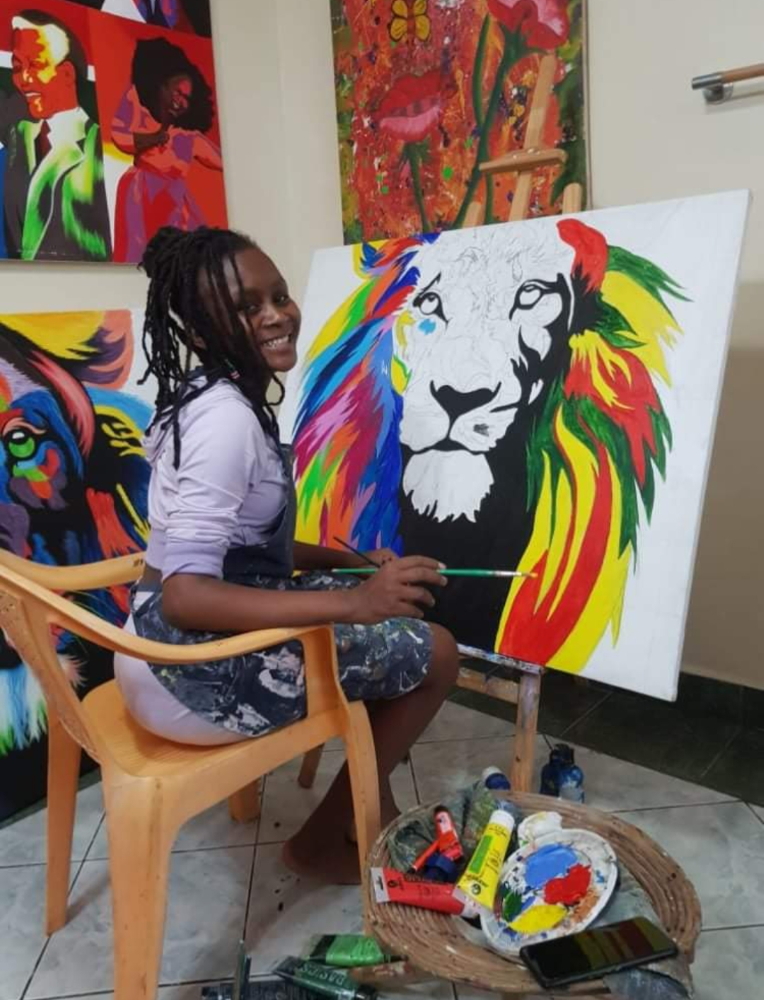
„Early pratice only makes the master“. No other saying is more appropriate to Sheilah Sheldone Charles than this one. At the age of five this native from Kenya in East Africa began to draw. The details regarding the early start were revealed by her during an interview with gcpawards.com. „When I told my mom that I love art, she said ‚all children draw these scribbles on their books‘, but I used to be the best in my art class. My mom was surprised when she saw some of my drawings, and she didn’t believe that I drew it. So, when we came to Mombasa, she asked me to draw her and I did that. After that, she recognized my talent and started supporting me.“ Then everything took its course.
Subjects of Sheilah Sheldone Charles‘ artwork is everything from wildlife to (fe)male icons – always in bold colours as well as abstract figures and being inspired by Pablo Picasso and Joan Miró. „I don’t know actually why I draw, but it’s just God-given. It’s something in me“, she’s quoted on bookofachievers.com. “I use paintings to tell stories, especially of women and children who, like my mother, suffer a great deal to give our lives meaning.” Thanks to her she founded the Sheilah Sheldone Arts for Social Change (CBO), a programme to pass on the painter’s personal skills to the next generation in her hometown. For the same purpose the artist went to the US to teach children of the community school how to paint and draw. In the States her artworks have been auctioned in a fundraising drive to help poor girls in Zimbabwe be able to go to school.
"I am proud of all of my talent, but I’m most proud of following my heart. I also feel glad that I can change childrens‘ lives as I inspire them to follow their passion.", said the multi-talent (designer of clothes, model, singer, actress, public speaker) to Global Child Prodigy.
At the end of the talk she had a recommendation for anybody, not just kids: „Just keep following your dreams and do whatever you love. It would be best if you always believe that you can!“ Her quote is in tune with the lyrics of the song by Nina Simone mentioned at the beginning: „In the whole world you know, there's a million boys and girls who are young, gifted and black, and that's a fact. We must begin to tell our young: there's a world waiting for you. Yours is the quest that's just begun...“
Sheilah Sheldone Charles lives with her parents and her younger brother in Mombasa, Kenya (East Africa).
Interview December 2022
"Follow your dreams and do what you love: always believe that you can!"
INTUITION/IMAGINATION
How does intuition present itself to you – in form of a suspicious impression, a spontaneous visualisation or whatever - maybe in dreams?
My intuition manifests itself in dreams, visions, and emotions. I always take notes or rough sketches because it varies occasionally but also happens anywhere.
Will any ideas be written down immediately and archived?
I always have to note everything down because if I don't, I risk forgetting some of the details or maybe the entire concept
?: How do you come up with good or extraordinary ideas?
Everything and everyone around me inspires me. When it comes to my thoughts, people, animals, and things all play a significant role. I am also inspired by other people's behaviour. All of this may develop as visions, dreams, and emotions, but at other times they may not be connected in any way, leaving me frequently puzzled.
Are great ideas based on intuition and do they reveal themselves in a kind of clear as well complete version that just has to be realized? Or is it endless trials and errors (after the first spark) that result in constant developments up until the final result?
Not all of my ideas are complete and well-formed; some require some thought on my part, and others require assistance, therefore my mother assists me. Even with assistance, there are instances when I'm unable to figure it out, so I begin a painting using the faint details from my intuition and keep going until things become clear. This can occasionally make me work on a painting for several months or even a year
What if there is a deadline, but no intuition? Does the first fuel the latter maybe?
My intuition, which I personally believe has no limits, has occasionally failed to appear when I have a tight deadline to meet. I try to think of a solution, like going over my notes again to see what I missed and add to it. I also try to add ideas to my intuition or ask for advice from those around me.
INSPIRATION
What inspires you and how do you stimulate this special form of imaginativeness?
I am inspired by what I observe, which is significant since it broadens my imagination and provides a foundation for the development of my intuition. I don't think I could be an artist without my imagination. Leonardo da Vinci is one of the artists I admire and hope to emulate someday
How do you separate the good from the bad and which ideas are worthwhile to be explored further or whether one idea has the potential of being outstanding really?
Any ideas that occur to me I often discuss with my mother, and she usually gives me advice on what to keep and what to throw away. My mother would occasionally suggest that I conduct online research on my ideas to check if they had already been executed or if they are fit.
Has it to appeal to you primarily or is its commercial potential an essential factor?
My personal judgement is more important and reliable than the commercial aspects of my work. I have the opportunity to voice my opinions since my mum constantly asks my opinion before doing anything.
Do you revisit old ideas or check what colleagues/competitors are up to at times?
I constantly want to get better, but I also want to be loyal to who I am, so I try to avoid looking back on my earlier work and wishing I could alter it. Instead, I strive to make improvements to my current work and occasionally observe what others are doing in order to include some of it into both my work and my thoughts
CREATIVITY
Which time/place/environment suits your creative work process the best (tranquillity or pressure) and which path do you take from theory/idea to creation?
Not all of my paintings were created when I was in a peaceful atmosphere or with a cheerful intention. My creativity thrives in any location, at any time, and in any emotional state. I therefore cannot express all of my thoughts in a calm environment.
What is better in the realization process: speed and force creativity i.e. grasp the magic of the moment, or a slow, ripening process for implementation/elaboration?
My method of realisation is rather easy. I always make notes on my intuition, so the next step is to sketch it down quickly to capture the main ideas. Afterwards, I transfer the drawing to the canvas and begin painting. As I work, new concepts and images emerge, and I build upon my basic intuition. Even if my ideas conflict with one another occasionally while I'm painting, the final results are fantastic, and I'm amazed by them.
If problems occur during creativity or one’s stuck even, how can these be solved?
It's quite simple to be stuck when working on a painting. I attempt to figure out why I'm stuck and try to fix it, but sometimes it's not that simple so I have to take a break for the painting; it could take a short period, but sometimes it takes a long time. Taking breaks from my painting allows me to regain my flow and spark new thoughts.
How important are self-doubt and criticism (by others) during such a process i.e. is it better to be creative on your own, only trust your own instincts, or in a team?
Not everything I make is appreciated by everyone, and I sometimes receive criticism from others. As a result, I sometimes doubt my own abilities and the outcomes of my paintings. However, my mother always reassures me and says that as long as I am happy with my work, it does not matter what other people think of it.
I enjoy working alone as much as with others. Because we can explore so many more ideas while working with others, work becomes more enjoyable and interesting. I enjoy working by myself because I can make mistakes without worrying about being judged.
Should a creative always remain true to him-/herself including taking risks & going against the flow or must one, for reasons of (commercial) survival, make concessions to the demands of the market, the wishes of clients and the audience’s expectations?
A creative person needs to be loyal to themselves and take risks by defying all the rules. A creative person must create the things that others desire or reject, and this must correspond with their vision. I am aware of the significance of selling artwork and the necessity of following market trends. Going against the odds results in new market demands.
How is innovation still possible if one has established a distinctive style and, just in case, is it good to be ahead of one’s time even one hazards not being understood?
Painting in a specific style is like having a terrible habit; with little effort and time, you can break it. A creative person is able to do things that could be uncomfortable or outside of their comfort zone, therefore it is still possible to be innovative.
When does the time come to end the creative process, to be content and set the final result free - or is it work-in-progress with an endless possibility of improvement?
It can be quite tempting to keep changing the painting, but there are times when it's important to stop when I'm satisfied with the result. It starts to drag on, but I stop it when I'm satisfied.
In case of failure or - worse - a creativity crisis how do you get out of such a hole?
In the event of a failure, I examine what went wrong and determine whether it can be fixed; if not, I may begin the painting process all over again. There are times when I have to begin or start a new project because the hole has become too wide and I have sunk too far.
SUCCESS
Should/can one resist the temptation to recycle a ‘formula’ one’s successful with?
It is tempting to redo a successful painting, but I make an effort to stay away from this and instead create new works of art. By creating paintings that are unrelated to the successful painting, it is possible to avoid it
Is it desirable to create the ultimate/timeless work, but doesn’t “top of the ladder” bring up the question of “what’s next?” i.e. isn’t such a personal peak “the end”?
I occasionally produce something that I am so pleased with, which makes me think it will sell the most, but sometimes it never works out that way. I get quite disappointed and demotivated by this, yet I persist and strive to produce more works of art that give me pride and happiness.
MY FAVORITE WORK:
The lion is my favourite piece; it is one of the paintings that has given me the most joy and pride. The lion painting is one that I have experimented with, added various techniques to, and developed over time. Through the colours I apply to the lion, I am able to communicate my feelings, such as happiness or sadness. The artwork of the lion will always hold a special place in my heart.
